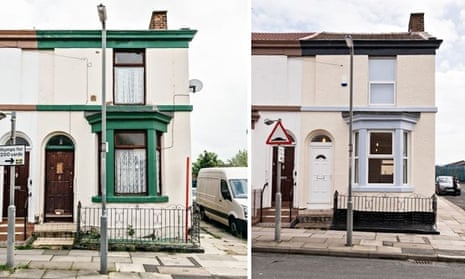It is the “ethical” alternative to buy-to-let that is targeting older people looking to cash in their pension funds, and boasts a tempting 7%-a-year return.
The Real Estate Annuity Plan (Reap) allows people to lend money to a social enterprise that specialises in converting derelict properties into affordable rented homes for those in need, such as families on council waiting lists. It is being offered by a Merseyside-based mutual organisation called Equfund, and is aimed at those looking for a better return than they would get from a traditional annuity.
Reap may also appeal to those who would like a slice of property market action but are put off by the high costs/perceived hassle/questionable ethics of buy-to-let. It allows them to use their money in a way that benefits local communities. But it’s not risk-free.
So what is Reap exactly? It is a scheme offered by Equfund whereby you loan the company money for five years. In return, it will pay interest at a rate of 7% a year gross, which you can take as a fixed monthly or quarterly income.
The loan is secured against a property – so you are effectively providing a mortgage to Equfund. That property will be used to provide affordable housing to private tenants, which will produce a rental income from which your interest will be paid. After five years you get the loan amount back in full, subject to 90 days’ notice, or you can choose to continue with the arrangement.
Who or what is Equfund? It is a social enterprise and affordable housing provider based in West Kirby on the Wirral peninsula near Liverpool. It is a community benefit society – a type of mutual similar to a co-operative whereby any profits are ploughed back into providing better services or facilities. Set up in 2000, it specialises in buying empty properties and refurbishing them, and says that over the past 15 years it has brought more than 1,000 properties back into habitable use. Equfund currently owns about 125 properties, about 60 of which are in the Merseyside area.
So how exactly does this work? The loans are only secured on the fully refurbished properties, after all the work has been carried out, and the maximum loan per property is 75% of its open market value, as assessed by an independent chartered surveyor.
Give me an example Let’s say Equfund buys a derelict two-bedroom house in Merseyside for £40,000. It’s “the worst house in a good street” and has been empty for years. Equfund spends £20,000 on repairs and improvements – perhaps a new kitchen, plumbing and electrics and so on. The property is then independently valued at, say, £80,000.
A Reap loan up to a maximum of £60,000 (ie, 75% of the value) would then be allocated to the property. We will assume it is one individual, John Smith, lending the whole £60,000, but it could be four people each lending £15,000. This leaves the remaining £20,000 free of any debt to act as a buffer against property value fluctuations.
Equfund finds tenants for the property, who pay it rent in line with Local Housing Allowance (LHA) levels, which in Liverpool is £455 a month for a two-bed property. So over 12 months, Equfund will receive £5,460 (£455 x 12) in rent. Of that, Smith gets £4,200 (7% of £60,000). After five years Smith will have received £21,000, plus he gets his original £60,000 back.
In this example, the outstanding £1,260 a year that the company receives goes into a pot to cover things such as “voids” – periods when the property is not rented out – or a broken boiler.
Who is this aimed at? Equfund says Reap is open to anyone with a minimum of £15,000 to lend/invest, but says it is “ideally suited” to retirees. If you were looking for a monthly income of £100 you would have to lend £17,100, while a monthly income of £300 would involve lending just over £51,000.
What are the downsides? The biggest drawback is that Reap isn’t covered by any financial services compensation scheme. So if Equfund were to go bust, you could potentially lose some or all of your money. Equfund director, Danny Mahon, says that what would happen is that the appointed “security trustee” (a solicitor) would step in, take charge of the property, sell it and return the money to the investor(s). Alternatively, it could keep the arrangement going and carry on paying the income.
Another downside is that while investors enjoy a regular fixed income, they don’t benefit from any increase in property values – although Reap isn’t dependant on house prices rising. So if, during the next five years, the value of the property on which Smith has his money loaned was to plunge 25%, he would still get back 100% of his original loan amount. But if the value of the property doubled, he would get back his original loan amount and no more.
What if the property crashes in value by more than 25%? Equfund insists Smith wouldn’t be out of pocket. A 30% fall, say, would reduce the £80,000 property’s value to £56,000. If that is what had happened after five years, Smith would be able to demand his full £60,000 back, and the society would have to make up the £4,000 difference. “We’ve borrowed money and must give that money back, otherwise we are in default,” Mahon says. However, Smith might opt instead to carry on receiving an income, during which time prices might bounce back.
Anything else? Your income is unaffected if there are void periods or the tenant gets into arrears, says the society, which also takes care of “everything from finding tenants and checking references to managing an inventory and dealing with unexpected problems”.
Are there any fees or charges? No.
Why is it an ethical option? Equfund says that as well as bringing empty homes back into use, it is offering tenants affordable decent housing, while providing investors with a fair return.
It adds that it caters for the tenants that some other landlords “choose to avoid”. The society also caps its rents by making its properties among the cheapest 30% available locally, and where possible aims to reduce carbon emissions and increase energy efficiency.







Comments (…)
Sign in or create your Guardian account to join the discussion